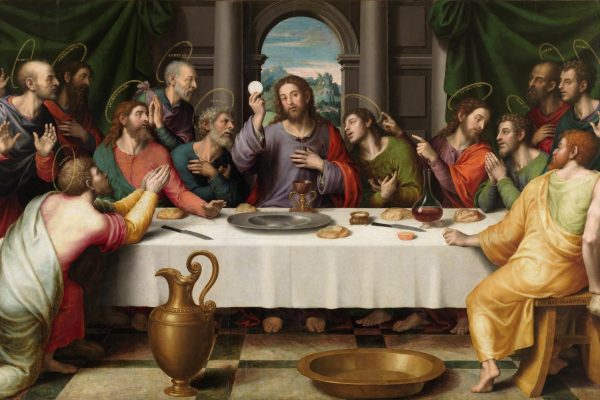Home>Christian Videos>Bible Stories>Who Were John The Baptist’s Disciples


Bible Stories
Who Were John The Baptist’s Disciples
Published: March 6, 2024
Peter Smith, Editorial Director at Christian.net, combines deep insights into faith, politics, and culture to lead content creation that resonates widely. Awarded for his contributions to religious discourse, he previously headed a major organization for religious communicators, enhancing dialogue on faith's societal impacts.
Learn about John the Baptist's disciples and their significance in the Bible stories. Explore their role and impact in the context of biblical teachings.
(Many of the links in this article redirect to a specific reviewed product. Your purchase of these products through affiliate links helps to generate commission for Christian.net, at no extra cost. Learn more)
Table of Contents
Introduction
Who were John the Baptist's disciples? This question delves into the historical and religious context of John the Baptist, a prominent figure in Christianity and other faith traditions. Understanding the identity, teachings, and influence of John the Baptist's disciples provides insight into the early foundations of the Christian faith and the impact of John the Baptist's ministry. In this article, we will explore the role of John the Baptist, the identity of his disciples, their teachings and influence, the relationship between John the Baptist and his disciples, and the lasting legacy of his followers.
Read more: Who Were John The Baptist Disciples
The Role of John the Baptist
John the Baptist played a crucial role in the religious landscape of his time. He is recognized as a prophet in Christianity, Islam, and other faith traditions. John's primary role was to prepare the way for the coming of Jesus Christ. He preached about repentance and the forgiveness of sins, urging people to turn away from their wrongdoing and embrace a life of righteousness. John's message was one of spiritual renewal and transformation, emphasizing the need for inner purification and moral uprightness. His role as a herald of the Messiah, as foretold in the Old Testament, positioned him as a significant figure in the fulfillment of prophecy and the establishment of the Christian faith.
John the Baptist's ministry also included the practice of baptism, symbolizing the cleansing of sins and the readiness for the arrival of the Messiah. His baptismal rituals attracted large crowds seeking spiritual renewal and a deeper connection with God. John's uncompromising message and ascetic lifestyle garnered attention and followers, setting the stage for the emergence of a devoted community of disciples who would continue his mission and teachings.
John's unwavering commitment to his divine calling and his fearless proclamation of truth challenged the religious and political authorities of his time. His role as a prophetic voice in the wilderness, calling people to repentance and spiritual awakening, left a lasting impact on the religious consciousness of the era. John the Baptist's influence extended beyond his immediate followers, shaping the religious landscape and paving the way for the ministry of Jesus Christ.
The Identity of John the Baptist's Disciples
-
Diverse Backgrounds: John the Baptist's disciples came from various walks of life, reflecting the inclusive nature of his ministry. They included fishermen, tax collectors, and individuals from different social and economic backgrounds. This diversity underscored John's message of repentance and spiritual renewal, transcending societal barriers and welcoming all who sought a deeper connection with God.
-
Commitment to John's Teachings: The disciples of John the Baptist were deeply committed to his message of repentance and preparation for the coming of the Messiah. They embraced his call to live lives of integrity and moral uprightness, embodying the principles of his teachings in their daily lives.
-
Preparation for the Messiah: As followers of John the Baptist, his disciples actively participated in the baptismal rituals that symbolized a readiness for the arrival of the Messiah. They wholeheartedly embraced John's mission of spiritual preparation and eagerly anticipated the fulfillment of his prophecies regarding the coming of the Christ.
-
Transition to Jesus' Ministry: While John the Baptist's disciples were devoted to him, their ultimate allegiance shifted to Jesus Christ upon encountering His ministry. This transition marked a pivotal moment in the identity of John's disciples, as they recognized Jesus as the fulfillment of the prophecies and the long-awaited Messiah.
-
Continuation of John's Legacy: Despite their transition to following Jesus, many of John the Baptist's disciples continued to uphold his teachings and principles, integrating them into their newfound faith in Christ. Their experiences with John the Baptist's ministry and their subsequent embrace of Jesus' teachings contributed to the rich tapestry of early Christian discipleship, shaping the foundation of the Christian faith.
-
Influence on Early Christian Community: The identity of John the Baptist's disciples as individuals who transitioned from John's ministry to following Jesus highlights their significant role in the early Christian community. Their unique position as witnesses to both John the Baptist and Jesus Christ contributed to the diverse perspectives and experiences that enriched the early spread of the Christian faith.
The Teachings and Influence of John the Baptist's Disciples
The teachings and influence of John the Baptist's disciples reverberated throughout the early Christian community, leaving an indelible mark on the burgeoning faith. As inheritors of John's message of repentance and spiritual renewal, his disciples carried forward his core teachings, infusing them with a sense of urgency and anticipation for the arrival of the Messiah. Their influence extended beyond their immediate circle, shaping the collective consciousness of early Christian believers and contributing to the foundational principles of the faith.
Teachings of Repentance and Moral Integrity
Central to the teachings of John the Baptist's disciples was the call to repentance and the cultivation of moral integrity. Drawing from the foundational message of their mentor, the disciples emphasized the need for individuals to turn away from sin and embrace a life of righteousness. Their teachings echoed John's impassioned plea for inner transformation, urging people to align their actions with principles of justice, compassion, and ethical conduct. This emphasis on personal accountability and moral uprightness resonated deeply with those who sought spiritual guidance and a renewed sense of purpose.
Read more: Who Were Disciples Of John The Baptist
Preparation for the Messiah
The disciples of John the Baptist fervently propagated the message of preparing for the imminent arrival of the Messiah. Building upon the anticipation instilled by their mentor, they exhorted people to ready themselves for the transformative impact of the long-awaited Savior. Their teachings underscored the significance of spiritual readiness and the need to cultivate a receptive heart in anticipation of encountering the Messiah. This emphasis on preparedness and spiritual vigilance permeated the early Christian community, fostering a sense of eager expectation and hope for the fulfillment of divine promises.
Influence on Early Christian Communities
The teachings of John the Baptist's disciples exerted a profound influence on the early Christian communities, contributing to the formation of a shared ethos grounded in repentance, moral integrity, and anticipation of the Messiah. Their unwavering commitment to upholding the principles espoused by John the Baptist fostered a sense of continuity and coherence within the nascent Christian movement. As they transitioned from heralding John's message to embracing the ministry of Jesus Christ, the disciples carried with them a legacy of spiritual fervor and a deep-seated conviction in the transformative power of divine grace.
Integration of John's Teachings with Jesus' Message
While the disciples of John the Baptist remained faithful to his teachings, their encounter with Jesus Christ marked a pivotal juncture in their spiritual journey. They seamlessly integrated the foundational principles imparted by John with the profound teachings of Jesus, forging a holistic understanding of spiritual truth and redemption. Their influence in bridging the continuity between John's ministry and the advent of Jesus contributed to the seamless transition of core spiritual tenets, enriching the fabric of early Christian theology and practice.
Enduring Legacy
The teachings and influence of John the Baptist's disciples left an enduring legacy that permeated the early Christian movement and reverberates through the annals of Christian history. Their unwavering commitment to repentance, moral integrity, and spiritual preparedness laid the groundwork for the transformative impact of Jesus' ministry and the subsequent spread of the Christian faith. The disciples' steadfast dedication to upholding the prophetic legacy of John the Baptist contributed to the cohesive tapestry of early Christian beliefs, shaping the contours of a faith grounded in spiritual renewal, ethical conduct, and the anticipation of divine fulfillment.
The Relationship between John the Baptist and His Disciples
The relationship between John the Baptist and his disciples was characterized by a profound sense of spiritual mentorship, unwavering commitment, and a shared vision of preparing the way for the coming of the Messiah. As the herald of the Messiah, John the Baptist assumed the role of a spiritual guide and mentor to his disciples, imparting to them his fervent message of repentance and spiritual renewal. The disciples, in turn, demonstrated a deep reverence for their mentor, embracing his teachings with fervor and dedication. Their relationship was marked by a mutual sense of purpose, as they collectively sought to fulfill the prophetic mission of heralding the arrival of the long-awaited Savior.
John the Baptist's disciples exhibited a profound sense of loyalty and allegiance to their mentor, recognizing him as a transformative figure whose teachings held the key to spiritual enlightenment and preparation for the Messiah. Their willingness to wholeheartedly embrace John's message and participate in the baptismal rituals underscored their deep respect and commitment to his spiritual leadership. The disciples looked to John as a beacon of divine truth, drawing inspiration from his unwavering dedication to his prophetic calling and his fearless proclamation of spiritual truths.
The relationship between John the Baptist and his disciples was characterized by a shared sense of anticipation and readiness for the fulfillment of divine promises. The disciples eagerly embraced John's teachings, internalizing his message of spiritual preparedness and the imminent arrival of the Messiah. Their collective sense of urgency and expectancy created a bond of shared anticipation, as they awaited the realization of John's prophecies and the dawn of a new era marked by the presence of the long-awaited Savior.
John the Baptist's disciples actively participated in his ministry, accompanying him as he preached and administered baptismal rites. Their close association with John fostered a sense of camaraderie and shared mission, as they worked in unison to disseminate his message and prepare the hearts of the people for the coming of the Messiah. The disciples' active involvement in John's ministry solidified their bond with him, creating a cohesive community united by a common purpose and unwavering devotion to their mentor's teachings.
The relationship between John the Baptist and his disciples transcended mere discipleship, evolving into a profound spiritual kinship rooted in a shared commitment to divine purpose. Their collective journey of spiritual awakening and anticipation of the Messiah forged a deep bond of camaraderie and mutual support, as they navigated the challenges and triumphs of their shared mission. The disciples' steadfast allegiance to John and their wholehearted embrace of his teachings exemplified the depth of their spiritual connection and their unwavering dedication to fulfilling the prophetic mandate entrusted to them.
The relationship between John the Baptist and his disciples served as a testament to the transformative power of spiritual mentorship and the enduring impact of a shared vision. Their collective efforts to prepare the way for the Messiah, coupled with their unwavering commitment to upholding John's teachings, exemplified the profound resonance of their relationship. As they journeyed together in anticipation of the fulfillment of divine promises, the bond between John the Baptist and his disciples epitomized a harmonious union of spiritual guidance, shared purpose, and unwavering devotion.
The Legacy of John the Baptist's Disciples
The legacy of John the Baptist's disciples reverberates through the annals of Christian history, leaving an indelible imprint on the early foundations of the faith. Their unwavering commitment to John's message of repentance, spiritual renewal, and anticipation of the Messiah contributed to the enduring legacy that shaped the trajectory of early Christian discipleship and belief.
The disciples of John the Baptist played a pivotal role in bridging the continuity between John's ministry and the advent of Jesus Christ. Their transition from heralding John's teachings to embracing the transformative message of Jesus marked a significant juncture in the evolution of early Christian faith. Their seamless integration of John's core principles with the profound teachings of Jesus enriched the fabric of Christian theology, fostering a holistic understanding of spiritual truth and redemption.
The disciples' steadfast dedication to upholding the prophetic legacy of John the Baptist contributed to the cohesive tapestry of early Christian beliefs, shaping the contours of a faith grounded in spiritual renewal, ethical conduct, and the anticipation of divine fulfillment. Their influence permeated the early Christian movement, contributing to the formation of a shared ethos grounded in repentance, moral integrity, and eager expectation of the Messiah's arrival.
The enduring legacy of John the Baptist's disciples is evidenced in their pivotal role as witnesses to both John and Jesus, embodying a unique perspective that enriched the early spread of the Christian faith. Their experiences with John's ministry and their subsequent embrace of Jesus' teachings contributed to the diverse tapestry of early Christian discipleship, shaping the foundation of the faith and laying the groundwork for the transformative impact of Jesus' ministry.
The disciples' unwavering commitment to repentance, moral integrity, and spiritual preparedness left an indelible mark on the early Christian community, fostering a sense of continuity and coherence within the nascent Christian movement. Their legacy resonates through the corridors of Christian history, serving as a testament to the enduring impact of their collective dedication to upholding the prophetic vision of John the Baptist and embracing the transformative message of Jesus Christ.













